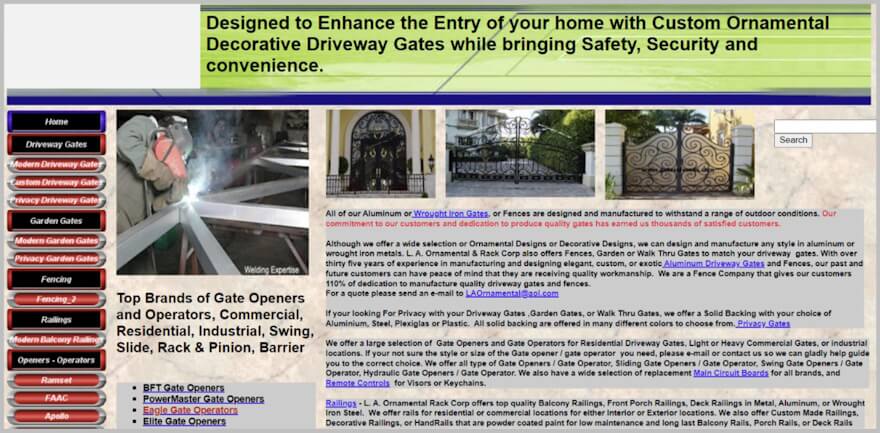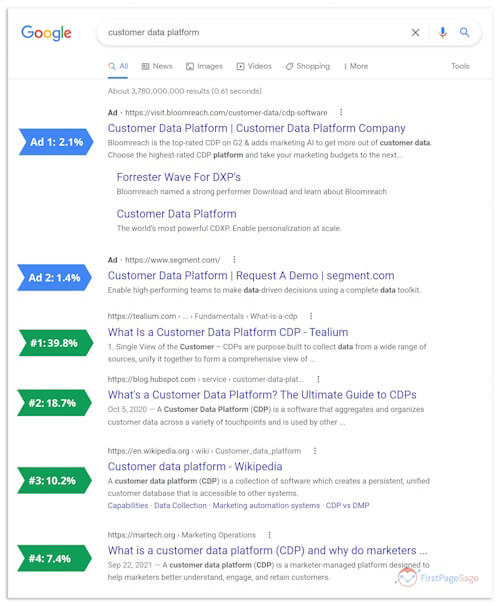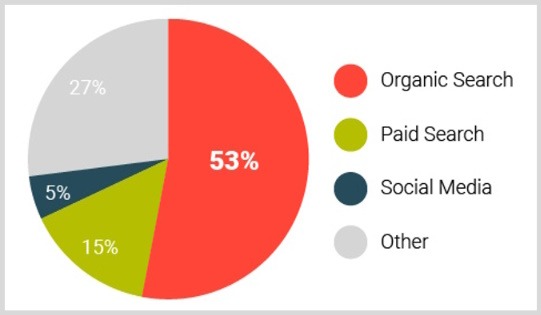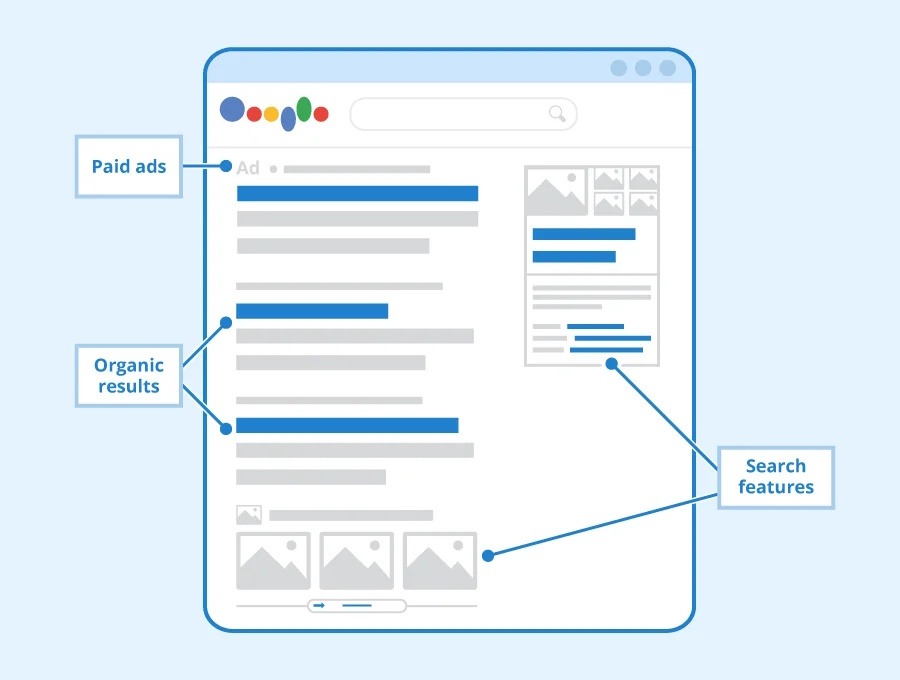If you own a small business, chances are you’ve wondered at some point: is SEO really worth it?
I’ve been an SEO consultant for over 10 years — and I’ve seen that the answer is not so simple.
Let’s start with a quick myth-bust: search engine optimization (SEO) is NOT a cure-all. It’s not going to solve for whatever ails a website. SEOs are trained to optimize your website for increased traffic and conversions. We can’t turn a flawed business into a good one.
What does a “flawed” business look like?
A business that doesn’t have its fundamentals down pat.
For example: a business that
- has no unique selling proposition, or
- lacks even a minimum viable product, or
- has a cluttered, outdated, visually overwhelming interface that hasn’t been touched since 2005
I’ve occasionally been asked to perform SEO magic on these kinds of sites. I’ve always gently declined — because sometimes the baby is just ugly, and no amount of website optimization is going to change that. 😬

An actual gate company website, circa 2024
So who IS a good fit for SEO?
The good news: if you’ve got your ducks in a row — i.e. your fundamentals are strong — SEO can prove transformative.
Is that you?
Well, if you’re a small to midsize business and:
- Your multi-page website is an accurate reflection of your business strategy
- Your product/service offer is relevant to what more than one person is searching for
- You get some search traffic (though not necessarily from search engines)
… then SEO is absolutely worth it.
Website optimization can help you stand out in the vast digital marketplace, draw more eyeballs to your site, and convert the nebulous “they” into dedicated, loyal customers.
👆 This all sounds great. But what does it actually mean? And more importantly, how does it actually work?
Why SEO even matters
When some people hear about SEO, their eyes glaze over. It’s complicated; it’s technical; it takes time and money and careful long-term planning.
Is it really that important? Is it worth the hassle? Can you just ignore it and still run a successful risotto rice farm?
Absolutely — but only if you care nothing about your Google search rankings.
Think about it. When was the last time you clicked past Page 1 of search results on Google? Or even scrolled to the end of Page 1?
Exactly.
No one ventures to the second page unless they’re researching their doctoral thesis — and even then, who has the time? If your website doesn’t show up on Page 1 of the search results, it’s like your business doesn’t exist.
Here’s an eye-opening stat from FirstPageSage:
⭐A #1 ranking in your niche generates a 39.8% click-through rate, on average. That’s a massive traffic share, considering that the #2 and #3 spots get 18.7% and 10.2% respectively.

“Google Click-Through Rates (CTRs) by Ranking Position in 2024,” FirstPageSage
And did you notice the paid ads in the image above?
The top paid ad got 2.1% clickthrough — vs. 39.8% for the top organic spot.
That’s a big difference. What emerges is that paid media can certainly jump start your visibility, but if you can’t get your website to rank organically on Google, paid spend just WON’T be enough.
You need to prioritize your website’s ranking.
Right now, at this very moment, there are people searching for what your business offers. And in the vast, rolling plains of the internet, you want to make sure your small business isn’t obscured by your competitor’s dancing billboard.
When you take the time to understand and leverage SEO, you’re investing in a glitzy neon sign for your business —albeit a digital one.
The reason people come to your website is to get something they need, and they want a great experience while doing it. For your online presence to be effective, the experience must be baked into every interaction you have with them; it will make or break where they decide to spend their money.
SEO is all about doing all the little stuff that makes Google (and other search engines, but let’s be real, mostly Google) sit up and notice your website. We’re talking about getting your website to show up when folks type in stuff they’re daydreaming about buying.
It’s about understanding what people search for online, the answers they seek, the words they use, and the type of stuff they want to read. SEO is all about getting your website more visible, so when someone in Des Moines is excitedly searching for artisanal pickles, they discover your ingenious dill creations instead of your competitor’s sad, soggy cucumbers.
Why invest my limited marketing budget in SEO?
Let’s discuss why SEO isn’t just a nice-to-have but a must-have for your growing business. Think of it as a sophisticated domino effect: when your search rankings improve, more potential customers discover your digital doorstep. As these visitors arrive and engage with your content, your site’s authority naturally rises, creating a self-reinforcing cycle of visibility.
With high rank and wider exposure to your high-value content, more sites will link to your pages. This strengthens your domain authority and builds lasting credibility, creating a continuous cycle of improved search performance. As your position rises in Google’s rankings, the more you will effectively reach your audience.
Increased Organic Traffic
When we say ‘organic traffic,’ we’re referring to the number of people who stumble upon your website through non-paid search engine results. Google is like the grand dating show host introducing you to millions of eligible audience members. When you’ve got great SEO, your website climbs up the web-result rankings, and Google is that helpful buddy giving you a boost.
Ask yourself: just how much more revenue could your website generate if it could be found by more people than your immediate family?
Improved Brand Awareness
Think of SEO as your business’ largest megaphone and Google as your town square. The more efficient your SEO, the louder your megaphone. You need to be seen to be remembered. Get it right and you’ve transformed from hidden needle to shining haystack.
When search engines recognize you as a trusted authority, it elevates your brand’s entire digital presence. Strategic SEO paired with a premium website is your direct path to earning that trust.
Higher Conversion Rates
Every digital marketing effort around your business points directly to your website. Visitors will judge within 0.5 seconds whether they like your website’s look and feel (and want to do business with you) or hit the back button and visit your competitor.
The aim isn’t just to get folks clicking willy-nilly; we want them to stick around, buy something, and preferably come back often. That’s where “it’s the quality, not the quantity,” holds true. The right SEO can lead the right kind of traffic to your site.
Long-Term Results
Let’s be clear here: SEO isn’t a magic wand. It’s more like raising a house plant. It takes time, care, and a bit of research. But when done right, it can bear fruit over a long time and unlike tacky trends, it won’t fade out.
The ROI of SEO for small business
Lastly, let’s face it, for small businesses – budgets matter. It’s not about throwing wads of cash at ads; it’s about growing your visibility organically and snagging those customers who are already looking for your unique flask koozies!
In most cases, SEO traffic converts higher than any other channel and has the highest ROI. According to BrightEdge, 53% of all web visits come from organic traffic, while only 15% comes from paid search.

Organic Channel Share, BrightEdge
Also, in a study by AdLift, companies that invested in significantly increasing SEO traffic over paid search saw their customer acquisition cost drop by around 60 percent. And in a marketing study by Gartner, SEO took the win with small businesses reporting it as 60% more effective than traditional marketing strategies.
Why, you ask? While other strategies can feel like yelling into a void, hoping someone hears you, SEO brings you right into your audience’s living room, at the moment when they’re actually looking for what you’ve got.
Let’s be real, there’s always going to chit-chat about new marketing strategies popping up faster than you can say TikTok. But at the end of the day, SEO is still the guiding North Star that can help small businesses grow, thrive, and outlive the flavor-of-the-month marketing fads.
How long does SEO take to generate results?
Doing keyword research, creating authentic content, optimizing images, et cetera, takes more than a hot minute. It’s something that must be iterated on time and time again, something that has to remain dynamic and evolving and fresh. The investment is like a long-term commitment — it pays dividends.
But especially for small to midsize businesses, there are also simple, low-cost, and quick wins, many of which need only be done once to have a positive lasting effect. An advanced SEO consultant has the years of experience to be able to quickly identify wins and errors that might otherwise take you years (and precious brain cells) to achieve on your own.
The Timeline
Typically, SEO efforts can start showing results in about 90 days, while substantial changes may take anywhere from six months to a year.
The early stages involve strategic planning, keyword research, and establishing a solid foundation – essentially, setting the stage for your grand performance. Then comes the content creation, on-site optimization, and forming a buzz via social media and link-building. Gradually, you inch your way up the search engine ladder.
The Gen AI Shiny Penny
You may be tempted to game the system a bit with all these fancy new generative AI tools. A client phoned me after ChatGPT launched and proudly announced he had “written” 50 blogs in under 90 minutes. He graciously sent me a few to read; I lost consciousness after the first 250 words.
There’s a noticeable lack of authenticity in content generated by AI, which is why Google is pushing back — HARD. Announcing its March 2024 core update, Google said: “We’re making algorithmic enhancements to our core ranking systems to ensure we surface the most helpful information on the web and reduce unoriginal content in search results.”
Google predicted that this update and their previous efforts would reduce low-quality, unoriginal content in search results by 40%.
Those 50 blogs my client wrote using AI? He posted them to his website in late 2023, and saw an initial burst of traffic. Even converted a few leads. He crowed about how easy that was and how much money he saved on content creation. And after the March core update, Google took it all away. He phoned me again for help.
So, while all the brilliant SEOs out there are studying ChatGPT, Gemini and large language models (LLMs) to develop content they think will make them look so much smarter than everyone else, I’ll be over here focused on my small business clients, solving their ranking and content issues, and improving their conversions and sales.
For now, anyway, human review, analysis, relevant expertise, and creativity are still essential job requirements.
Your mileage may vary
Now, everyone’s SEO journey is unique. Variables like your industry, competition, target audience, the current state of your site, and the expertise level of your SEO team can all influence the time it takes to see the results. You might be a ‘schwing’ away from success or have to work a tad harder before you hit the sweet spot.
SEO isn’t just an option for small business strategy, though, it is the strategy. SEO is like the Swiss Army Knife of your marketing toolkit. It might not always look flashy, but it delivers early and often. Unlock and unleash its potential, and you might just be our next heartening success story.





